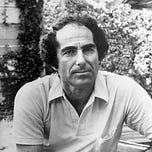I couldn’t be more excited to launch Morbid Symptoms, the podcast of this newsletter. The goal is to eventually do one of these podcasts per week, although it’ll be a bit flexible at the start as I experiment with the format.
For the first podcast, I speak with one of my best friends, Jessica Johnson, the editor of The Walrus, about controversies swirling around the late novelist Philip Roth and his biographer, Blake Bailey. This is what I hope will be the first of many podcasts with Jessica as my guest. As you’ll hear, she has a lively, ironic mind and isn’t afraid to challenge my blindspots and evasions.
The story of Roth and his biographer(s) is one of a famed novelist with an overwhelming need to control the narrative of life. This led him to make a series of bad decisions: hubris followed by nemesis. In other words, a classic Philip Roth story.
It’s also the story of a generation of Roth super-fans, led by Cynthia Ozick and David Remnick, who eagerly embraced a flawed biography because they wanted a monumental tribute to their literary hero. The inability of these fans to take a more nuanced view of Roth is part of the story Jessica and I take up.
Even if you don’t care for Roth – like Jessica! – it’s a fascinating cultural story about the sexual revolution and its aftermath.
I previously wrote about the Roth/Bailey biography on this newsletter here and in The Nation here. Since I last wrote, some of the questions I raised have been answered: I want to make clear that based on subsequent reporting, it’s clear Dwight Garner acted in an honourable way to protect a friend’s privacy. Bailey’s original publisher, W.W. Norton, has decided to stop publishing the book, but it’s been taken up by another publisher, Skyhorse.
Roth’s extreme need to control the narrative of his life included his insistence that some of his private papers can only be seen by Bailey and would after the publication of the biography be destroyed. Given the controversy over the biography, this is an unreasonable demand. The Philip Roth Society has issued a very persuasive petition demanding the papers be saved for scholarly use.
Here are links to a few essays referenced in the discussion.
Laura Marsh’s excellent review in The New Republic of Bailey.
Viviane Fairbank in The Walrus on the necessity and limits of fact-checking.
Cynthia Ozick’s review of the Bailey book in The New York Times Book Review.
David Remnick’s New Yorker review of the Bailey book.
The podcast was produced by Julia Elinore Peterson.
Share and Subscribe
If you enjoyed this podcast, think about sharing:
And subscribing:















Share this post